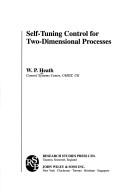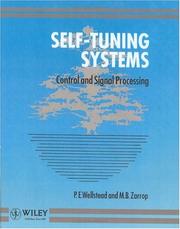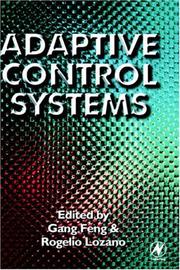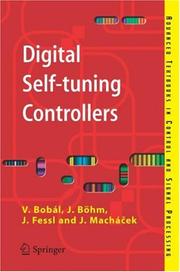| Listing 1 - 8 of 8 |
Sort by
|
Book
ISBN: 0863411274 Year: 1988 Publisher: London : Peregrinus,
Abstract | Keywords | Export | Availability | Bookmark
 Loading...
Loading...Choose an application
- Reference Manager
- EndNote
- RefWorks (Direct export to RefWorks)

ISBN: 0863801668 Year: 1994 Publisher: Taunton : Research studies press,
Abstract | Keywords | Export | Availability | Bookmark
 Loading...
Loading...Choose an application
- Reference Manager
- EndNote
- RefWorks (Direct export to RefWorks)

ISBN: 0471928836 Year: 1991 Publisher: Chichester : J. Wiley,
Abstract | Keywords | Export | Availability | Bookmark
 Loading...
Loading...Choose an application
- Reference Manager
- EndNote
- RefWorks (Direct export to RefWorks)
Adaptive control systems --- Self-tuning controllers --- Systèmes adaptatifs --- Adaptive control systems. --- Self-tuning controllers. --- Systèmes adaptatifs
Book
ISBN: 0906048621 Year: 1981 Volume: 15 Publisher: [London New York : Institution of electrical engineers, Peter Peregrinus],
Abstract | Keywords | Export | Availability | Bookmark
 Loading...
Loading...Choose an application
- Reference Manager
- EndNote
- RefWorks (Direct export to RefWorks)
Adaptive control systems --- Systèmes adaptatifs --- Self-tuning controllers --- Controllers, Self tuning --- Regulators, Self tuning --- Self-tuning regulators --- Self-adaptive control systems --- Artificial intelligence --- Feedback control systems --- Self-organizing systems --- Adaptive control systems. --- Self-tuning controllers. --- Systèmes adaptatifs --- Mathématiques --- Mathématiques --- Controle actif --- Systeme adaptatif

ISBN: 1281077275 9786611077273 0080498604 0750639962 9780750639965 9780080498607 9781281077271 Year: 1999 Publisher: Boston ; Oxford : Newnes,
Abstract | Keywords | Export | Availability | Bookmark
 Loading...
Loading...Choose an application
- Reference Manager
- EndNote
- RefWorks (Direct export to RefWorks)
Adaptive control is no longer just an important theoretical field of study, but is also providing solutions to real-world problems. Adaptive techniques will transform the world of control. The leading world practitioners of adaptive control have contributed to this handbook which is the most important work yet in this field. Not only are techniques described in theory, but detailed control algorithms are given, making this a practical cookbook of adaptive control for both control professionals and practising engineers.The book presents the most advanced techniques and algorithms of ada
Adaptive control systems. --- Self-tuning controllers. --- Controllers, Self tuning --- Regulators, Self tuning --- Self-tuning regulators --- Adaptive control systems --- Self-adaptive control systems --- Artificial intelligence --- Feedback control systems --- Self-organizing systems --- Engineering --- General and Others
Book
ISBN: 1316093123 1316093484 1316093573 1316093301 1316093212 1316093395 1316093662 1107415969 9781316093399 9781316093214 9781107058712 1107058716 Year: 2014 Publisher: Cambridge : Cambridge University Press,
Abstract | Keywords | Export | Availability | Bookmark
 Loading...
Loading...Choose an application
- Reference Manager
- EndNote
- RefWorks (Direct export to RefWorks)
Proportional-integral-derivative (PID) controllers are extensively used for efficient industrial operations. Autotuning such controllers is required for efficient operation. There are two ways of relay autotuning cascade control systems - simultaneous tuning and sequential tuning. This book discusses incorporation of higher order harmonics of relay autotuning for a single loop controller and cascade control systems to get accurate values of controller ultimate gain. It provides a simple method of designing P/PI controllers for series and parallel cascade control schemes. The authors also focus on estimation of model parameters of unstable FOPTD systems, stable SOPTD and unstable SOPTDZ systems using a single relay feedback test. The methodology and final results explained in this book are useful in tuning controllers. The text would be of use to graduate students and researchers for further studies in this area.
Relay control systems. --- Self-tuning controllers. --- Electric relays --- Automatic control. --- Relays, Electric --- Electric circuit-breakers --- Electric switchgear --- Controllers, Self tuning --- Regulators, Self tuning --- Self-tuning regulators --- Adaptive control systems --- Control systems, Relay --- Automatic control
Book
ISSN: 01785354 ISBN: 1447147561 1447158814 1283933438 144714757X Year: 2013 Publisher: London : Springer London : Imprint: Springer,
Abstract | Keywords | Export | Availability | Bookmark
 Loading...
Loading...Choose an application
- Reference Manager
- EndNote
- RefWorks (Direct export to RefWorks)
There are many methods of stable controller design for nonlinear systems. In seeking to go beyond the minimum requirement of stability, Adaptive Dynamic Programming for Control approaches the challenging topic of optimal control for nonlinear systems using the tools of adaptive dynamic programming (ADP). The range of systems treated is extensive; affine, switched, singularly perturbed and time-delay nonlinear systems are discussed as are the uses of neural networks and techniques of value and policy iteration. The text features three main aspects of ADP in which the methods proposed for stabilization and for tracking and games benefit from the incorporation of optimal control methods: • infinite-horizon control for which the difficulty of solving partial differential Hamilton–Jacobi–Bellman equations directly is overcome, and proof provided that the iterative value function updating sequence converges to the infimum of all the value functions obtained by admissible control law sequences; • finite-horizon control, implemented in discrete-time nonlinear systems showing the reader how to obtain suboptimal control solutions within a fixed number of control steps and with results more easily applied in real systems than those usually gained from infinte-horizon control; • nonlinear games for which a pair of mixed optimal policies are derived for solving games both when the saddle point does not exist, and, when it does, avoiding the existence conditions of the saddle point. Non-zero-sum games are studied in the context of a single network scheme in which policies are obtained guaranteeing system stability and minimizing the individual performance function yielding a Nash equilibrium. In order to make the coverage suitable for the student as well as for the expert reader, Adaptive Dynamic Programming for Control: • establishes the fundamental theory involved clearly with each chapter devoted to a clearly identifiable control paradigm; • demonstrates convergence proofs of the ADP algorithms to deepen undertstanding of the derivation of stability and convergence with the iterative computational methods used; and • shows how ADP methods can be put to use both in simulation and in real applications. This text will be of considerable interest to researchers interested in optimal control and its applications in operations research, applied mathematics computational intelligence and engineering. Graduate students working in control and operations research will also find the ideas presented here to be a source of powerful methods for furthering their study. The Communications and Control Engineering series reports major technological advances which have potential for great impact in the fields of communication and control. It reflects research in industrial and academic institutions around the world so that the readership can exploit new possibilities as they become available.
Automatic control. --- Intelligent control systems. --- Self-tuning controllers. --- Mechanical Engineering --- Engineering & Applied Sciences --- Mechanical Engineering - General --- Dynamic programming. --- Algorithms. --- Algorism --- Engineering. --- Artificial intelligence. --- System theory. --- Mathematical optimization. --- Computational intelligence. --- Control engineering. --- Control. --- Optimization. --- Artificial Intelligence (incl. Robotics). --- Computational Intelligence. --- Systems Theory, Control. --- Control engineering --- Control equipment --- Control theory --- Engineering instruments --- Automation --- Programmable controllers --- Intelligence, Computational --- Artificial intelligence --- Soft computing --- Optimization (Mathematics) --- Optimization techniques --- Optimization theory --- Systems optimization --- Mathematical analysis --- Maxima and minima --- Operations research --- Simulation methods --- System analysis --- Systems, Theory of --- Systems science --- Science --- AI (Artificial intelligence) --- Artificial thinking --- Electronic brains --- Intellectronics --- Intelligence, Artificial --- Intelligent machines --- Machine intelligence --- Thinking, Artificial --- Bionics --- Cognitive science --- Digital computer simulation --- Electronic data processing --- Logic machines --- Machine theory --- Self-organizing systems --- Fifth generation computers --- Neural computers --- Construction --- Industrial arts --- Technology --- Philosophy --- Algebra --- Arithmetic --- Mathematical optimization --- Programming (Mathematics) --- Systems engineering --- Foundations --- Systems theory. --- Control and Systems Theory. --- Artificial Intelligence.

ISBN: 1846280419 1852339802 Year: 2005 Publisher: London : Springer London : Imprint: Springer,
Abstract | Keywords | Export | Availability | Bookmark
 Loading...
Loading...Choose an application
- Reference Manager
- EndNote
- RefWorks (Direct export to RefWorks)
Adaptive control theory has developed significantly over the past few years; self-tuning control represents one branch of adaptive control that has been successfully applied in practice. Controller design requires knowledge of the plant to be controlled which is not always readily accessible; self-tuning controllers gather such information during normal operation and adjust controller designs on-line as required. Digital Self-tuning Controllers presents you with a complete course in self-tuning control, beginning with a survey of adaptive control and the formulation of adaptive control problems. Modelling and identification are dealt with before passing on to algebraic design methods and particular PID and linear-quadratic forms of self-tuning control. Finally, laboratory verification and experimentation will show you how to ground your theoretical knowledge in real plant control. Features: • comprehensive coverage providing everything a student needs to know about self-tuning control from literature survey to the control of an experimental heat exchanger; • a strong emphasis on practical problem solving with control algorithms clearly laid out in easy-to-follow formulae or made directly available as Matlab® functions making the book particularly suitable as an aid to project work; • specially written MATLAB® toolboxes convenient for the presentation of typical control system and plant properties and ready for use in direct control of real or simulated plants available from springeronline.com; • worked examples and tutorial exercises to guide you through the learning process. Digital Self-tuning Controllers comprises an invaluable course with which graduate students and advanced undergraduates can learn how to overcome the significant problems of putting the powerful tools of adaptive control theory into practice. The text will also be of much interest to control engineers wishing to employ the ideas of adaptive control in their designs and plant.
Self-tuning controllers. --- Adaptive control systems. --- Engineering. --- Chemical engineering. --- System theory. --- Control engineering. --- Industrial engineering. --- Production engineering. --- Electrical engineering. --- Control. --- Signal, Image and Speech Processing. --- Electrical Engineering. --- Systems Theory, Control. --- Industrial Chemistry/Chemical Engineering. --- Industrial and Production Engineering. --- Electric engineering --- Engineering --- Manufacturing engineering --- Process engineering --- Industrial engineering --- Mechanical engineering --- Management engineering --- Simplification in industry --- Value analysis (Cost control) --- Control engineering --- Control equipment --- Control theory --- Engineering instruments --- Automation --- Programmable controllers --- Systems, Theory of --- Systems science --- Science --- Chemistry, Industrial --- Engineering, Chemical --- Industrial chemistry --- Chemistry, Technical --- Metallurgy --- Construction --- Industrial arts --- Technology --- Philosophy --- Self-adaptive control systems --- Artificial intelligence --- Feedback control systems --- Self-organizing systems --- Controllers, Self tuning --- Regulators, Self tuning --- Self-tuning regulators --- Adaptive control systems --- Computer engineering. --- Systems theory. --- Control and Systems Theory. --- Computers --- Design and construction --- Zelfregulering. --- Signal processing. --- Image processing. --- Speech processing systems. --- Computational linguistics --- Electronic systems --- Information theory --- Modulation theory --- Oral communication --- Speech --- Telecommunication --- Singing voice synthesizers --- Pictorial data processing --- Picture processing --- Processing, Image --- Imaging systems --- Optical data processing --- Processing, Signal --- Information measurement --- Signal theory (Telecommunication)
| Listing 1 - 8 of 8 |
Sort by
|

 Search
Search Feedback
Feedback About
About Help
Help News
News